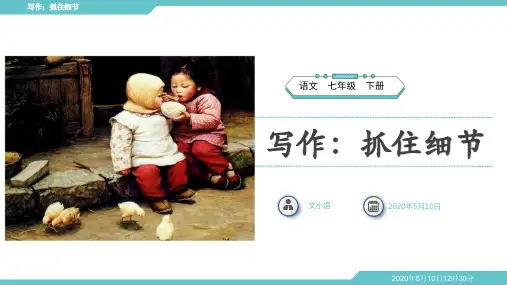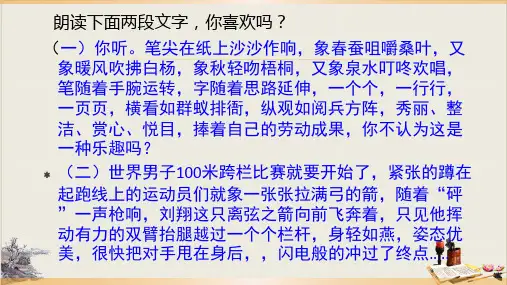使读者如见其人,如睹其物,如临其境。 细 节描写在刻画人物性格、丰满人物形象、连接 故事情节、丰富作品内涵等方面具有重要作用。 生动的细节描写,有助于折射广阔的生活画面, 表现深刻的社会主题。
方法一: 精用 动词
我看见他戴着黑布小帽,穿着黑布大马褂,深青布棉 袍,蹒跚地走到铁道边,慢慢探身下去,尚不大难。 可是他穿过铁道,要爬上那边月台,就不容易了。他 用两手攀着上面,两脚再向上缩;他肥胖的身子向左 微倾,显出努力的样子。这时我看见他的背影,我的 泪很快地流下来了。 (摘自朱自清《背影》)
抓住细节
PLEASE ENTER YOUR TITLE HERE
写作
运用你的想象合理扩展一句话,恰 当地添加动作、表情、神态、语言、 心理等将这句话的内容充实起来。
她骂他懦夫(《樱桃》山菊骂红红 野孩子)
*她骂他道:“你真是一个懦夫” (添加语言)
**她用手指着他的鼻子骂道:“你 真是一个懦夫”(添加动作)
方法二:巧用 修饰语
父亲佝偻着身子,慢慢地朝前面一个小店Байду номын сангаас 去。进了店门,父亲堆着满脸的笑:“老板, 生意好!请帮帮忙,换两张大钞票。”笑着 说着,贴满膏药的手伸进夹衣口袋,抖抖索 索地摸出一大把钱,摊到柜台上,当着老板 的面,几分的,几角的,半天才凑足了20块 钱。(摘自《山路弯弯》)
方法三:巧妙 的运用修辞
01
总之,好的细节描写,就犹如一座座精美的灵魂,有了它才能使人物性格鲜明,形象栩
栩如生。
02
抛砖引玉
抓住细节
写作实践
PART ONE
social ideals. They had been sent to Dresden at the age of fifteen, for music among other things. And they had had a good tim e there. They lived freely am ong the students, they argued w ith the m en over philosophical24, sociological and artistic25 matters, they were just as good as the m en themselves: only better, since they were women. And they tramped off to the forests with sturdy youths bearing guitars, twang-twang! They sang the W andervogel songs, and they were free. Free! That was the great word. Out in the open world, out in the forests of the morning, with lusty and splendidthroated young fellows, free to do as they liked, and--above all---to say what they liked. It was the talk that m attered supremely26: the im passioned interchange of talk. Love was only a m inor27 accompaniment. Both Hilda and Constance had had their tentative love affairs by the time they were eighteen. The young men w ith w hom they talked so passionately28 and sang so lustily and camped under the trees in such freedom wanted, of course, the love connexion. The girls were doubtful, but then the thing w as so m uch talked about, it was supposed to be so important. And the men were so humble29 and craving30. W hy couldn't a girl be queenly, and give the gift of herself? So they had given the gift of themselves, each to the youth with whom she had the most subtle and intimate arguments. The arguments, the discussions were the great thing: the love-making and connexion were only a sort of primitive31 reversion and a bit of an anticlimax. One was less in love with the boy afterwards, and a little inclined to hate him, as if he had trespassed32 on one's privacy and inner freedom. For, of course, being a girl, one's whole dignity and m eaning in life consisted in the achievement of an absolute, a perfect, a pure and noble freedom. W hat else did a girl's life mean? To shake off the old and sordid33 connexions and subjections. And however one m ight sentimentalize it, this sex










